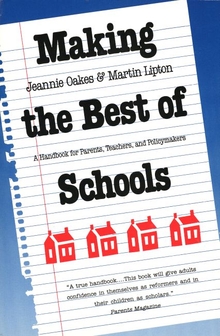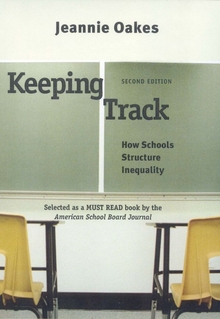Making the Best of Schools
WARNING
You are viewing an older version of the Yalebooks website. Please visit out new website with more updated information and a better user experience: https://www.yalebooks.com
A Handbook for Parents, Teachers, and Policymakers
Jeannie Oakes and Martin Lipton
"A true handbook. . . . This book will give adults confidence in themselves as reformers and in their children as scholars."-- Parents Magazine
"Finally! A readable book about schools and learning that doesn’t talk down to parents, the public, and teachers. If knowledge is power, then this book is an arsenal of intelligence for dealing with education."-- Albert Shanker, President, American Federation of Teachers
"The book speaks to parents who feel too excluded from the inner workings of schools to know how to influence them, and educators who may be too close to see the larger implications of their daily decisions."-- Beth Hakola, Education USA
"Making the Best of Schools gives all of us – parents, educators, policymakers, and concerned citizens – some cogent advice on how to make schools work for all young Americans."-- Marian Wright Edelman, President, Children’s Defense Fund
"A fine primer for new board members or board members whose expertise lies somewhere outside education. . . . It’s an inviting exploration, steeped in anecdotes and examples of good and bad practice."-- American School Board Journal
"Finally! A readable book about schools and learning that doesn’t talk down to parents, the public, and teachers. If knowledge is power, then this book is an arsenal of intelligence for dealing with education."—Albert Shanker, President, American Federation of Teachers
"Making the Best of Schools gives all of us—parents, educators, policymakers, and concerned citizens—some cogent advice on how to make schools work for all young Americans."—Marian Wright Edelman, President, Children’s Defense Fund
"A wise and profoundly useful work. In clear and accessible language, Oakes and Lipton address the issues involved in improving education with the goal of providing optimal educational experiences for all children, their families, and teachers. At a time when many feel hopeless about the future of education, Making the Best of Schools provides direction and inspiration."—Edward F. Zigler, Yale University
"Making the Best of Schools is a wise and profoundly useful work. Simultaneously pragmatic and visionary, the authors provide essential guidance and encouragement to beleaguered parents on how to work with their children and the school system. This advice covers both coping with the current school culture and improving the system to better meet children’s needs. Oakes and Lipton propose vital changes in support of teacher professionalism and provide policymakers with useful, research-based suggestions regarding changes in current statutes that would improve education for all children. Ultimately, the authors propose the creation of genuine community schools, with parents and teachers working together to provide a rich, meaningful education for all children.
"This is an empowering book. At a time when many feel hopeless about the future of education, Making the Best of Schools provides direction and inspiration."—Edward F. Zigler, Sterling Professor of Psychology and Director of the Bush Center in Child Development and Social Policy, Yale
"This book has invaluable information for parents, educators, and policymakers who are concerned about the quality of education in our nation today. More important, the authors set a tone—state a philosophy—regarding schools that can overcome much of the current confusion felt by a great many Americans about the values, goals, and importance of public education. Excellence in education for any child will indeed only come about when we as a community care about the education available to all children."— James P. Comer, m.d., author of Maggie’s American Dream and Maurice Falk Professor of Child Psychiatry, Yale University
"A pragmatic overview of American public education—what it has been, what it is now (good and bad), how it could be improved to offer an exciting, challenging school experience for all children. . . . The authors provide a useful, readable summary of current thinking about education."—Kirkus Reviews
"For poor and minority children, education is the main ticket to success in American society. But for too long, such children have been tracked into inferior schools and inferior classrooms. This book exposes those practices and their likely impact on the future productivity of our nation. More important, it gives all of us—parents, educators, policymakers, and concerned citizens—some cogent advice on how to make schools work for all young Americans."—Marian Wright Edelman, President, Children’s Defense Fund
"In clear detail, Jeannie Oakes and Martin Lipton explain and penetrate the assumption behind nearly every current schooling practice. Throughout the book they suggest practical steps individuals can take to advance an ambitious new agenda. The book speaks to parents who feel too excluded from the inner workings of schools to know how to influence them, and educators who may be too close to see the larger implications of their daily decisions. Oakes and Lipton, both long-time educators, explain concisely and without jargon theories of learning and testing, the nature of most classrooms, the effects of tracking, programs for children with special needs and parental effects on student success."—Beth Hakola, Education USA
"Oakes and Lipton attempt to define a new set of schooling basics for guiding individual children and for reforming schools. They offer advice on teaching basic subjects in meaningful ways, modifying home conditions to promote school success, and improving children’s self-esteem in the classroom."—School Administrator
"Empty-vessel theories of learning and misconceptions about individual differences shape the form and content of much school curriculum. We think schools can do better."—Jeannie Oakes and Martin Lipton, The Authors (from article in Education Week, 3/7/90)
"A thoughtful guide to the problems that exist in schools today and an ample resource for arriving at solutions. . . . Most useful to parents trying to make sense of their children’s needs. But it is also a fine primer for new board members or board members whose expertise lies somewhere outside education. . . . An inviting exploration, steeped in anecdotes and examples of good and bad practice—rather like a long conversation with a couple of enlightened educators."—American School Board Journal
"A true handbook in that it gives specific instructions on how to approach a school when a problem arises—whether it’s a matter of placing your child in a more advanced class or helping him finish his homework on time. This book will give adults confidence in themselves as reformers and in their children as scholars."—Parents Magazine
"A valuable tool addressed primarily to parents so they can understand and participate in reform."—Future Survey
"An ideal resource for parents who want to help their children `survive, cope and excel at school.’"—Values & Visions
Publication Date: July 24, 1991



